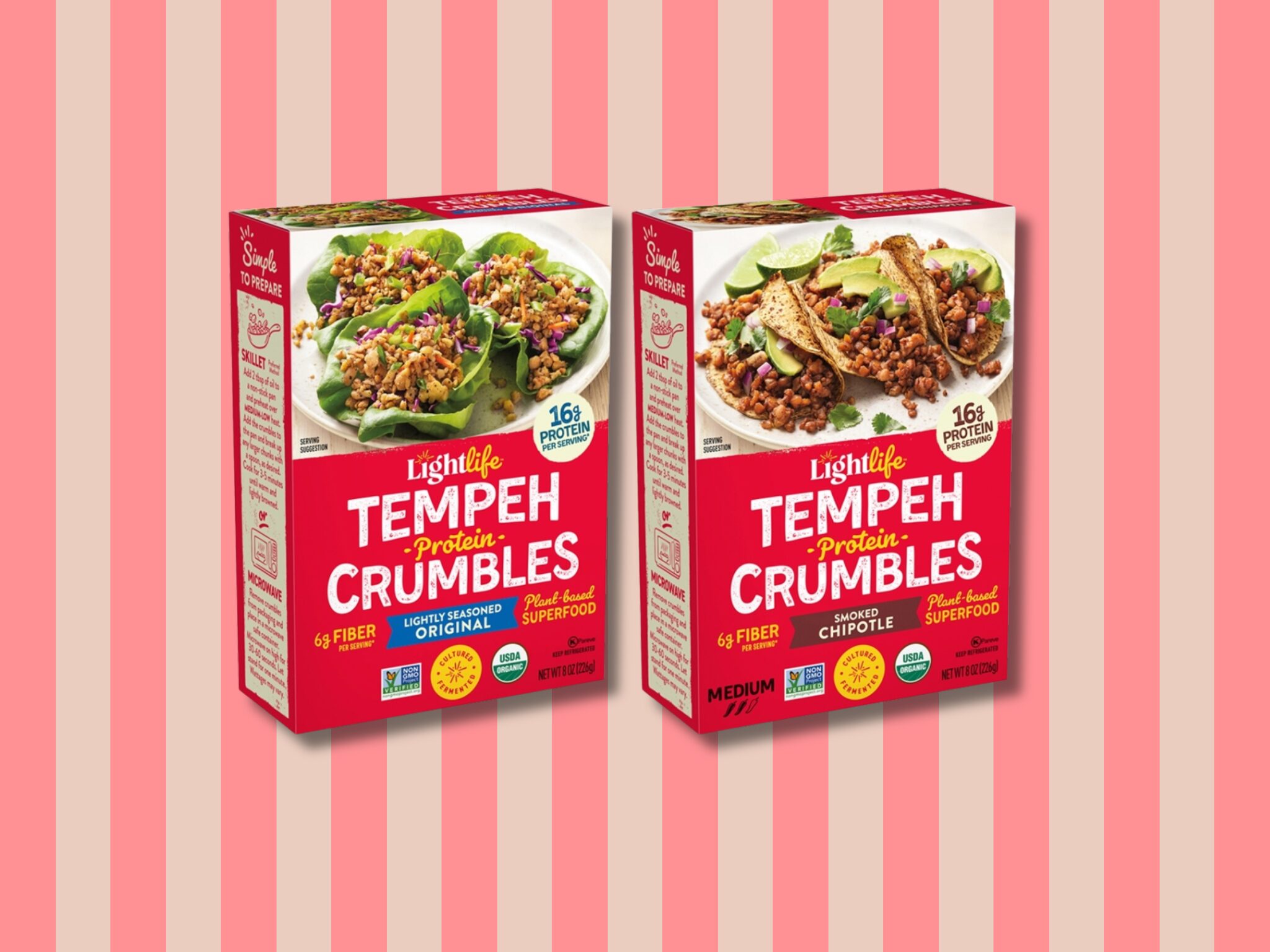4 Mins Read
One of 2024’s biggest plant-based trends continues to blossom, with Lightlife Foods launching Tempeh Protein Crumbles to rival its own vegan mince range amid a larger shift towards cleaner labels.
Long-standing plant protein maker Lightlife Foods has expanded its tempeh range with a crumble product as it seeks to take a slice of the red-hot whole-food plant-based meat market.
The new tempeh crumbles will complement Lightlife’s current lineup of tempeh strips and chunks, as well as its alternatives to sausages, hot dogs, bacon, deli slices, chicken tenders and ground beef. They’ll be available in two flavours: original and smoked chipotle.
“We’re excited to introduce more consumers to tempeh with our new Tempeh Protein Crumbles, a convenient and familiar form that can be used as a clean, vegan alternative to ground meat in any meal,” said Casey Richards, president of Lightlife’s parent company, meat giant Maple Leaf Foods USA.
Lightlife’s tempeh crumbles have more protein than its Smart Ground

Lightlife has been selling tempeh since 1979, and claims to be the top-selling tempeh brand in North America. This latest launch is in direct response to the ballooning demand for cleaner-label plant-based products, which is born out of consumer concerns about ultra-processed foods (which many plant-based meats are) and more nutritious meat alternatives.
“More and more consumers are seeking nutritionally dense, protein-rich foods that don’t rely on meat mimicry to delight them,” Richards said, and he’s not wrong. A poll by Mintel last year revealed that nutrition is the second-biggest reason (35%) for Americans’ unwillingness to eat plant-based meat (behind taste).
Likewise, a 1,022-person survey by the International Food Information Council (IFIC) found that health is the main reason Americans are vegan or vegetarian, with six in 10 choosing it. When it comes to alt-meat products, ‘healthy’ is the most appealing labelling description. Further research by ingredients giant Ingredion found that 78% of consumers are willing to spend more money on products with ‘natural’ or ‘all-natural’ packaging claims.
This is what Lightlife is banking on. Its own plant-based beef mince is made from soy protein, so, with the new tempeh crumbles, it will hope to lure in consumers who are wary of the former’s ingredient list. The brand has previously attracted controversy over a marketing campaign called Clean Break, where it attacked Beyond Meat and Impossible Foods’ long ingredient lists to promote its own 11-ingredient burger – it was a move considered by many as unwise, given that this rhetoric was reminiscent of the narrative pushed by the conventional meat industry, which is where Lightlife’s parent company lies.
Its plain Smart Ground beef analogue, meanwhile, has 14 ingredients, but the original tempeh crumbles only have four: soybeans, water, lactic acid and brown rice. The latter also has more protein (16g per serving vs 11g) and fibre (6g vs 3g), which is sure to appeal to consumers – although how this affects Lightlife’s existing beef mince analogue range will be interesting to see.
Lightlife plays into exploding whole-food trend

Tempeh was one of the ingredients mentioned in Whole Foods’ top food trends for 2024, alongside walnuts and legumes in a section titled Put the ‘Plant’ Back in ‘Plant-Based’. Lightlife’s Tempeh Protein Crumbles are certainly on trend.
The IFIC poll mentioned above found that among different protein sources, those from whole-plant sources saw the biggest hike in consumption, with 28% of Americans eating them ‘somewhat’ or ‘much more’. Moreover, these foods had the second-lowest decrease (11%) in intake, behind plant-based meat and seafood analogues (10%).
It has led to a surge in whole-food plant-based product launches. Beyond Meat itself revamped its vegan beef recipe to include fava beans and red lentils in a recipe accredited by the Clean Label Project (though that initiative is more focused on screening products for environmental toxins and ingredient quality).
Last month, fast-casual restaurant chain Smashburger teamed up with jackfruit meat startup Jack & Annie’s to launch a new whole-food plant-based burger. Chipotle’s braised tofu (Sofritas) and Shake Shack’s veggie burger are other examples of popular restaurants embracing whole foods. The menu of Chipotle founder Steve Ells’ new vegan chain Kernel is also focused on whole foods.
And for Veganuary, Dave’s Hot Chicken released its first meatless options in the form of cauliflower sliders and bites, while Hard Rock Cafe in Broadway rolled out a menu with cauliflower wings and a mushroom primavera pasta. Even across the Atlantic, Veganuary brought about the return of Burger King’s black bean burger, while Leon launched a gut-healthy bhaji wrap with courgettes, peas and broad beans.
Pizza Express, meanwhile, introduced a new calzone packed with vegetables, and fellow pizzeria Zizzi focused on Fable Foods’ pulled shiitake mushroom meat for its Rustic pizza. Pret A Manger spotlit mushrooms too, with a VLT featuring mushroom bacon rashers and a bánh mì championing sticky BBQ roasted mushrooms as the meat, just as Wagamama released a lion’s mane steak. In all these cases, whole-food options were their only new offerings for Veganuary.
And just this week, Hong Kong-based OmniFoods kickstarted the launch of its own whole-food plant-based OMNI Garden line, starting with a lion’s mane mushroom steak. With an increasing number of innovations in this space, can Lighlife’s tempeh crumble the negative sentiment towards plant proteins?




